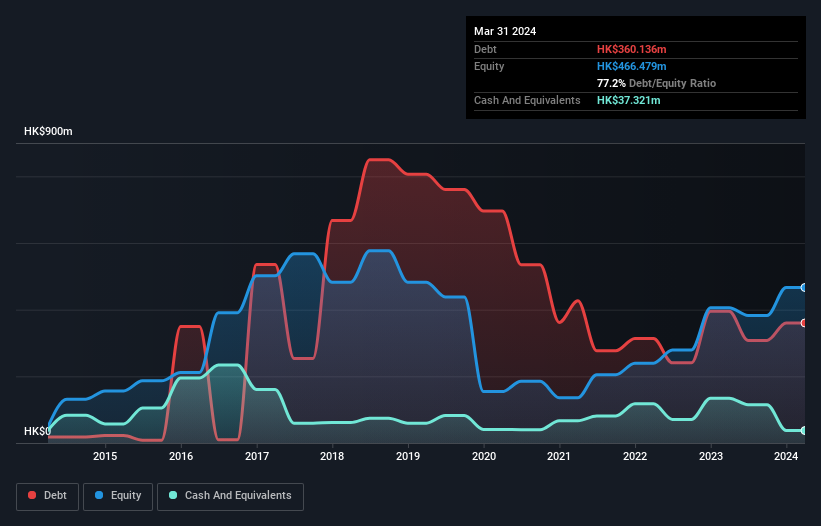
Warren Buffett famously said, 'Volatility is far from synonymous with risk.' It's only natural to consider a company's balance sheet when you examine how risky it is, since debt is often involved when a business collapses. We note that New Concepts Holdings Limited (HKG:2221) does have debt on its balance sheet. But the more important question is: how much risk is that debt creating?
When Is Debt Dangerous?
Debt and other liabilities become risky for a business when it cannot easily fulfill those obligations, either with free cash flow or by raising capital at an attractive price. If things get really bad, the lenders can take control of the business. While that is not too common, we often do see indebted companies permanently diluting shareholders because lenders force them to raise capital at a distressed price. Having said that, the most common situation is where a company manages its debt reasonably well - and to its own advantage. The first thing to do when considering how much debt a business uses is to look at its cash and debt together.
See our latest analysis for New Concepts Holdings
What Is New Concepts Holdings's Debt?
You can click the graphic below for the historical numbers, but it shows that New Concepts Holdings had HK$360.1m of debt in March 2024, down from HK$395.5m, one year before. However, it does have HK$37.3m in cash offsetting this, leading to net debt of about HK$322.8m.

How Strong Is New Concepts Holdings' Balance Sheet?
According to the last reported balance sheet, New Concepts Holdings had liabilities of HK$337.4m due within 12 months, and liabilities of HK$300.2m due beyond 12 months. On the other hand, it had cash of HK$37.3m and HK$261.9m worth of receivables due within a year. So it has liabilities totalling HK$338.3m more than its cash and near-term receivables, combined.
The deficiency here weighs heavily on the HK$144.6m company itself, as if a child were struggling under the weight of an enormous back-pack full of books, his sports gear, and a trumpet. So we'd watch its balance sheet closely, without a doubt. After all, New Concepts Holdings would likely require a major re-capitalisation if it had to pay its creditors today. The balance sheet is clearly the area to focus on when you are analysing debt. But you can't view debt in total isolation; since New Concepts Holdings will need earnings to service that debt. So if you're keen to discover more about its earnings, it might be worth checking out this graph of its long term earnings trend.
Over 12 months, New Concepts Holdings reported revenue of HK$628m, which is a gain of 15%, although it did not report any earnings before interest and tax. That rate of growth is a bit slow for our taste, but it takes all types to make a world.
Caveat Emptor
Importantly, New Concepts Holdings had an earnings before interest and tax (EBIT) loss over the last year. Indeed, it lost a very considerable HK$38m at the EBIT level. When we look at that alongside the significant liabilities, we're not particularly confident about the company. It would need to improve its operations quickly for us to be interested in it. Not least because it had negative free cash flow of HK$60m over the last twelve months. That means it's on the risky side of things. There's no doubt that we learn most about debt from the balance sheet. But ultimately, every company can contain risks that exist outside of the balance sheet. For example, we've discovered 5 warning signs for New Concepts Holdings (1 is a bit unpleasant!) that you should be aware of before investing here.
When all is said and done, sometimes its easier to focus on companies that don't even need debt. Readers can access a list of growth stocks with zero net debt 100% free, right now.
Valuation is complex, but we're here to simplify it.
Discover if New Concepts Holdings might be undervalued or overvalued with our detailed analysis, featuring fair value estimates, potential risks, dividends, insider trades, and its financial condition.
Access Free AnalysisHave feedback on this article? Concerned about the content? Get in touch with us directly. Alternatively, email editorial-team (at) simplywallst.com.
This article by Simply Wall St is general in nature. We provide commentary based on historical data and analyst forecasts only using an unbiased methodology and our articles are not intended to be financial advice. It does not constitute a recommendation to buy or sell any stock, and does not take account of your objectives, or your financial situation. We aim to bring you long-term focused analysis driven by fundamental data. Note that our analysis may not factor in the latest price-sensitive company announcements or qualitative material. Simply Wall St has no position in any stocks mentioned.
About SEHK:2221
New Concepts Holdings
An investment holding company, engages in the construction and environmental protection business in Hong Kong and Mainland China.
Slightly overvalued with imperfect balance sheet.
Market Insights
Community Narratives




